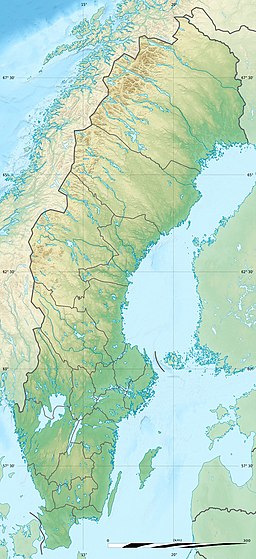Hornavan
| Hornavan | |
|---|---|
 The north-western part of the lake | |
 Hornavan Hornavan in Sweden | |
 Map of Lake Hornavan (upper left) in Sweden | |
| Location | Swedish Lapland |
| Coordinates | 66°14′N 17°30′E / 66.233°N 17.500°ECoordinates: 66°14′N 17°30′E / 66.233°N 17.500°E |
| Basin countries | Sweden |
| Surface area | 252 km2 (97 sq mi) |
| Max. depth | 221 m (725 ft) |
| Surface elevation | 425 m (1,394 ft) |
| Islands | 400 islets |
| Settlements | Arjeplog, Jäckvik |
Hornavan is a lake in northern Sweden. Located in Arjeplog Municipality in the province of Swedish Lapland, administratively known as Norrbotten County, it is the deepest lake in Sweden.
Geography[]
It is situated in the Scandinavian mountain range, at a height of 425 metres (1,394 ft). The town of Arjeplog is located on its south-western shore. The lake then extends 70 km (43 mi) northwest up to the town of Jäckvik, containing about 400 islets, many of which have distinguishable flora and fauna. Research on the ecosystems comparing the larger islands with smaller islets in Hornavan and are popular due to their unpolluted environment, and have yielded rewarding results[clarification needed]. In June 2005 an international study was published in Nature entitled Effects of species and functional group loss on island ecosystem properties.[1]
On its southern end, the lake attaches with the lake Uddjaure.
The surface area fluctuates between 220 and 283 km2 (85 and 109 sq mi), but some sources give it as constant 251 km2 (97 sq mi); in any case, it is the eighth largest lake in Sweden. With a largest depth of 221 metres (725 ft) it is also the deepest.
The lake has been cultivated for water power. Hornavan, like all lakes in Arjeplog Municipality, has drinkable water.
Fishing[]
Hornavan has 5 native species of whitefish: Coregonus pallasii, Coregonus megalops, Coregonus maxillaris, and Coregonus widegreni (the latter known under the name Valaam), with a sixth, Coregonus maraena, introduced in the 1940s. Trolling for trout in the lake is also popular.
Sources[]
- (in Swedish) Allmänt om Arjeplog Arjeplog Official Site
References[]
- ^ Wardle, David A.; Zackrisson, Olle (9 June 2005). "Effects of species and functional group loss on island ecosystem properties". Nature. 435 (7043): 806–810. doi:10.1038/nature03611. PMID 15944702. S2CID 12924161.
- Skellefte River basin
- Lakes of Norrbotten County
